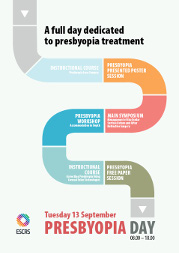Posters
Ribociclib and cornea verticillata: a case report
Poster Details
First Author: E. Espejo de los Riscos SPAIN
Co Author(s): M. Rodriguez Calvo de Mora C. Alba Linero
Abstract Details
Purpose:
To report a new ethiology of Cornea Verticillata (Vortex Keratopathy) in relation with Ribociclib, a new drug with potential antineoplastic activity
Setting:
Tertiary Care Center, Ophthalmology Service, Cataract and Primary Eye Care Unit
Methods:
A case of a woman with breast cancer that has been treated with Ribociclib. She notices haloes with no decreased of vision in both eyes. In the biomicroscopy only appeared golden brown deposits in the inferior interpalpebal portion of the cornea in a clockwise fashion. The funduscopy didn’t show anything of interest.
Results:
Cornea Verticillate or Vortex Keratopathy is characterized by whorl-like corneal epithelial deposits. There is a comprehensive list of systemic drugs (Amiodarona, Chloroquine…) is associated with it, and the differential diagnosis should also include Fabry’s disease. In our findings, there is no evidence in the relation between Ribociclib with Cornea Verticillata.
Conclusions:
Ribociclib is an orally available cyclin-dependent kinase (CDK) inhibitor targeting cyclin D1/CDK4 and cyclin D3/CDK6 cell cycle pathway, with potential antineoplastic activity. Actually, this agent is in Phase III study to treat hormone receptor-positive in certain types of cancer. We report a side effect of this new drug to include in the list of etiology of Cornea Verticillata.
Financial Disclosure:
NONE





